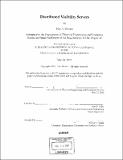Distributed visibility servers
Author(s)
Brittain, Eric A. (Eric Audwoyne), 1972-
DownloadFull printable version (3.857Mb)
Other Contributors
Massachusetts Institute of Technology. Dept. of Electrical Engineering and Computer Science.
Advisor
Seth J. Teller.
Terms of use
Metadata
Show full item recordAbstract
This thesis describes techniques for computing conservative visibility exploiting viewpoint prediction, spatial coherence and remote visibility servers to increase the rendering performance of a walk through client. Identifying visible (or partially visible) geometry from an instantaneous viewpoint of a 3-D computer graphics model in real-time is an important problem in interactive computer graphics. Since rendering is an expensive process (due to transformations, lighting and scan-conversion), successfully identifying the exact set of visible geometry before rendering increases the frame-rate of real-time applications. However, computing this exact set is computationally intensive and prohibitive in real-time for large models. For many densely occluded environments that contain a small number of large occluding objects (such as buildings, billboards and houses), efficient conservative visibility algorithms have been developed to identify a set of occluded objects in real-time. These algorithms are conservative since they do not identify the exact set of occluded geometry. While visibility algorithms that identify occluded geometry are useful in increasing the frame-rate of interactive applications, previous techniques have not attempted to utilize a set of workstations connected via a local area network as an external compute resource. We demonstrated a configuration with one local viewer and two remote servers.
Description
Thesis (S.M.)--Massachusetts Institute of Technology, Dept. of Electrical Engineering and Computer Science, 2001. Includes bibliographical references (leaves 54-55).
Date issued
2001Department
Massachusetts Institute of Technology. Department of Electrical Engineering and Computer SciencePublisher
Massachusetts Institute of Technology
Keywords
Electrical Engineering and Computer Science.